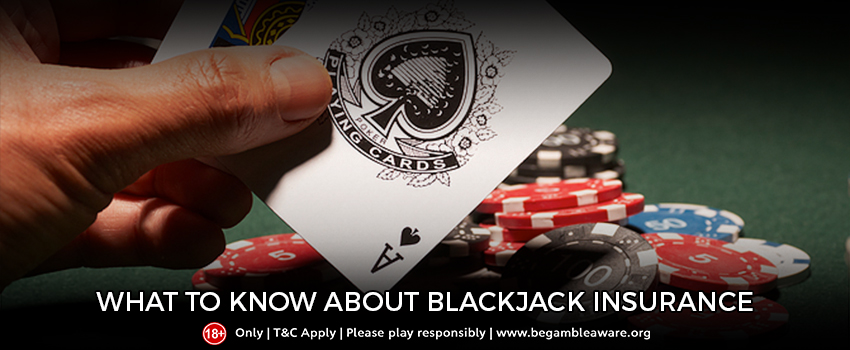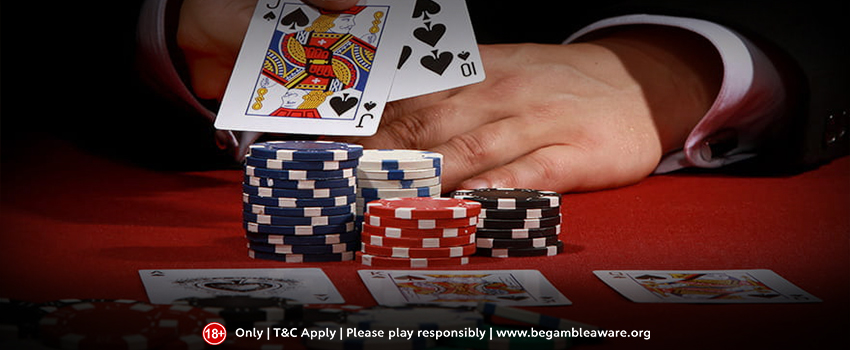Blog Posted on 12/04/2022 | Author: Karen Macarthur
What to Know About Blackjack Insurance

Many players are familiar with blackjack insurance, which is available to them. Blackjack insurance is only available to those who have not yet been insured. It is a side wager and can only be taken if the dealer has an ace.
It is distinct from all other players’ bets. Its purpose is to increase the margins at the blackjack tables. To ensure their hand, players must place a wager equal to half their initial bet next to their cards in the insurance section.
How does the Blackjack Insurance Bet work?
Players can either accept or decline insurance when the dealer has an ace, and they must place an additional wager equaling half of their initial bet to accept insurance.
However, some casinos permit partial insurance to be purchased for less, and insurance will cost you PS5 if your main wager is PS10.
The dealer would then examine their hole card and determine if it has a value greater than ten. If so, they would give them a Blackjack. A player who accepts insurance can have many outcomes.
This is the first scenario in which the dealer does not get blackjack. This is when players lose their insurance bet, which is PS5, but they get paid for having a Blackjack, 3 to 2.
If the dealer also has blackjack, players will get paid 2 to 1, and this is because the player loses their main wager.
A second scenario could be when the player and dealer have blackjacks. Thanks to the insurance, both hands push, and the player gets an amount equal to their initial wager.
Potent dealer blackjacks may not always be insurable, and the dealer can obtain this powerful hand if their upcard is worth ten. The US rules allow the dealer to peek under a player’s hole card to determine if it is an Ace for a Blackjack.
Before anyone makes any decisions, the peek happens. Everyone at the table loses immediately if the dealer has an Ace as their whole card.
Some casinos allow players to insure part of their wagers for less than half the amount. Partially insuring your hands for less than half of the original wager is possible for well-versed blackjack players.
This helps to reduce the variance. The term variance is used to describe the inherent swings in casino games, which can be very violent in blackjack.

What are the best times to get insurance?
When the dealer’s up card has an Ace, and your hand is decent, it is a good time to place an insurance wager.
Averagely, players lose more than half of their blackjack insurance bets, and because the bet pays 2 to 1, it could turn into a losing proposition. Insurance bets can cost you money statistically. This is especially true if you don’t know card-counting and basic strategy.
Basic Blackjack Strategy and Insurance
Blackjack insurance should not be purchased for players who cannot count cards or rely on the basic strategy. Insurance is not included in basic strategy charts, and this wager does not insure or protect you. Casinos are cleverly marketing the bet as insurance to increase their advantage against misguided patrons.
This proposition bet is on whether the dealer’s hole card will have a value greater than ten if they have an Ace showing. This side bet does not affect your main wager.
You will be able to recoup your loss and even make a profit even if the dealer does not have a natural. Your insurance wager will be lost if the dealer does not have a blackjack.
A basic strategy is not a good idea and can put you at a great disadvantage in the long term. The disadvantage mentioned is that it is easy to calculate, and the condition that one of every three cards is worth ten or less makes insurance a break-even bet.
A deck of 52 cards has only 16 cards with a value of 10 or 30.76%. A ten-value card is less common, about one per 3.25 cards. You can easily calculate the expected value of this side bet to estimate the devastating effect insurance has on players’ bankrolls.
If you have one deck of cards and receive two non-tens, there will be 16 ten cards from the remaining 49 cards. To account for the dealer’s ace and your two non-tens, the number of cards has fallen from 52 to 49. The dealer’s chance of getting a natural is now 16/49, while the probability of getting any other card is 33/49.
Conclusion
Before players decide on blackjack insurance, it is important to consider the following reasons and our advice. It is recommended that players are as prepared as they can before they begin playing.
If you don’t know who you are up against, you could make poor decisions that will lead to greater losses over the long term.
If you’re a recreational player who intends to base your play solely on basic strategy, you should forgo blackjack insurance.
This wager is only available if you can count cards accurately. This will allow you to spot the areas where the composition of the deck and shoe is justifiable, ensuring your hands.


